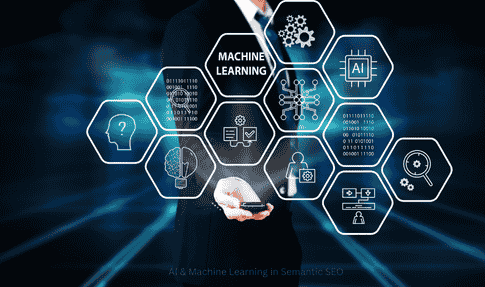Search engines are no longer just matching words. With the help of Artificial Intelligence (AI) and Machine Learning (ML), Google and other search engines can now understand the meaning, intent, and context of a search.
- AI enables search engines to process language like humans do.
- ML helps them learn from user behavior, clicks, and engagement to improve results over time.
This means content that answers questions, connects related ideas, and uses natural language is more likely to rank well. In other words, AI and ML reward pages that focus on helpful, people-first content rather than keyword repetition.
What is Semantic SEO?
Semantic SEO is the practice of building content around topics, entities, and context rather than individual keywords. Instead of just repeating the same keyword, the idea is to write content that answers what people are looking for and how search engines understand their intent.
Example:
- Traditional SEO → You only focus on the keyword “best running shoes.”
- Semantic SEO → You create a helpful guide that also talks about different running shoe brands, cushioning types, foot shapes, comfort, durability, and even how the right shoes can prevent injuries.
How AI and Machine Learning Support Semantic SEO
Natural Language Processing (NLP)
AI uses NLP to understand how people naturally phrase queries.
- Example: Google knows that “What’s the weather like in Delhi today?” and “Delhi weather forecast” are asking the same thing.
- It helps your content rank even if it doesn’t use the exact keyword, but still answers the intent behind it.
Entity Recognition
Machine Learning identifies entities like people, places, brands, and concepts in your content.
- Example: If you write about Apple, Google can tell whether you mean the fruit or the company, depending on context.
- It strengthens your content’s relevance by connecting it to recognized concepts that search engines already understand.
Learning from User Behavior
ML tracks how users interact with search results—clicks, time on page, bounce rates—to improve future rankings.
- If people find your content helpful, it signals to Google that your page deserves higher visibility.
Contextual Understanding
AI systems like BERT and MUM analyze entire sentences instead of just keywords.
- It means long-form, topic-focused content performs better than short, keyword-stuffed articles.
Benefits of AI and ML in Semantic SEO
- Better rankings across related searches
- Increased topical authority by covering subjects in detail
- Improved user satisfaction as content matches intent
- Future-proof strategy since AI-driven search is only growing
FAQ
Q1: How does AI improve search results?
AI improves search by understanding intent, context, and meaning, not just words.
Q2: Is Semantic SEO better than traditional keyword SEO?
Yes. Traditional SEO mainly targets single keywords, but Semantic SEO focuses on topics, context, and user intent. This approach helps content rank for many related searches and gives more stable, long-term results.
Q3: What role does NLP play in Semantic SEO?
Natural Language Processing (NLP) helps search engines read content the way people do. It understands meaning, synonyms, and natural phrasing, so your content is more likely to appear for different variations of a search.
Q4: Can small businesses benefit from Semantic SEO?
Even a local business can grow its visibility by writing content that answers customer questions in detail, connects related topics, and shows expertise in its field.
Q5: How do I start using Semantic SEO?
Start by creating content around topics instead of just keywords. Add related entities (like brands, categories, locations), answer real questions, and use natural language that matches how people search.
Conclusion
AI and Machine Learning have reshaped how search works. By combining these technologies with Semantic SEO, businesses can create content that not only ranks but also genuinely helps people. Instead of chasing single keywords, focus on topics, intent, and entities.
Want to see how Semantic SEO can help your business grow? Contact a Semantic SEO Consultant today.





